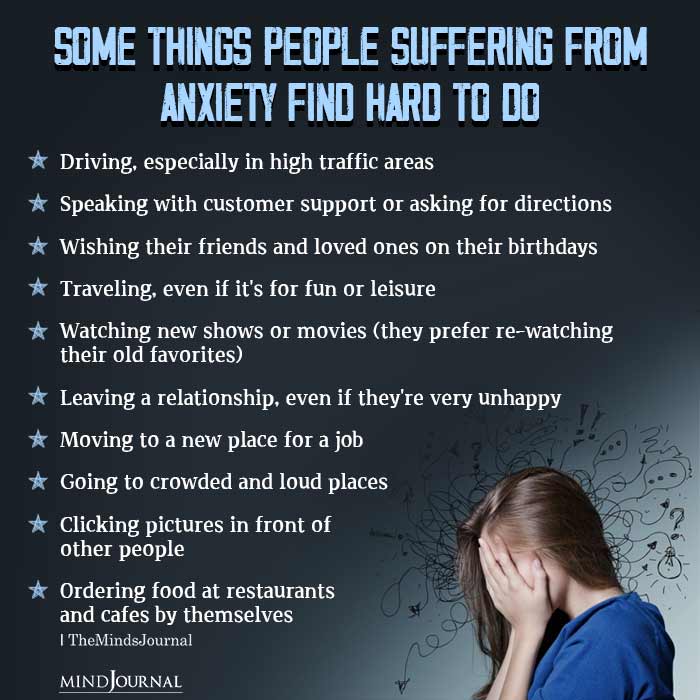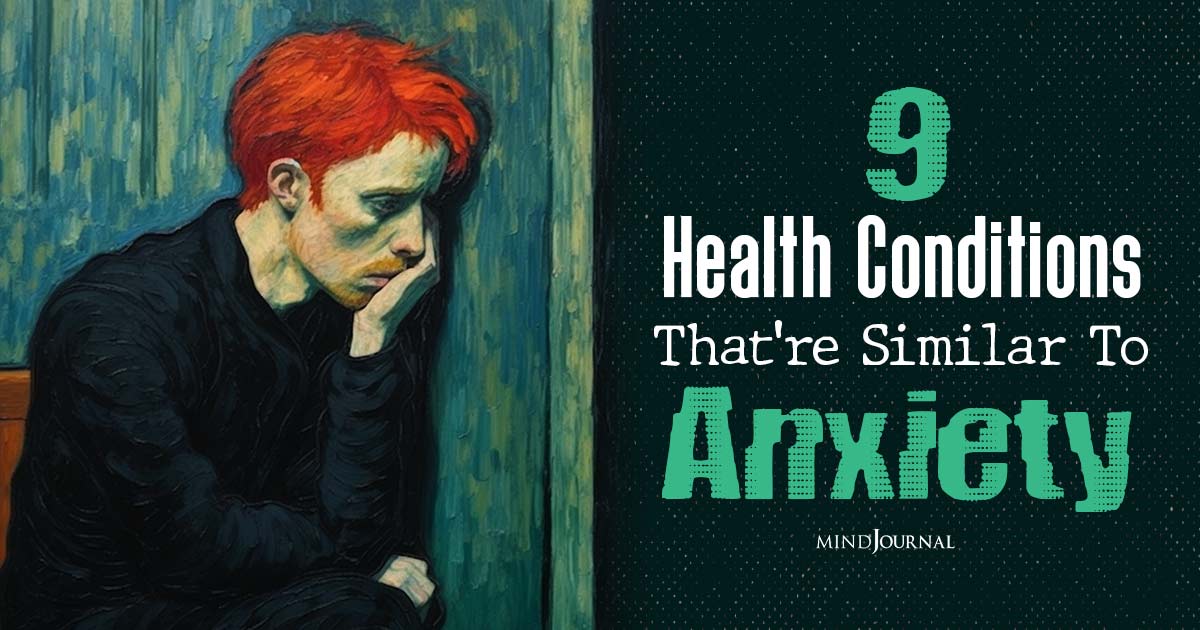Do you constantly feel on edge, tense, or worried? Maybe you experience a racing heartbeat, sweating, or shakiness that you just can’t seem to shake. If this sounds all too familiar, you may be dealing with anxiety. But did you know there are several other health conditions that are similar to anxiety?
Let’s dive into 9 different health issues that can feel a lot like anxiety. From hormonal imbalances to electrolyte issues, these conditions can easily be mistaken for an anxiety disorder as they often have the same symptoms of anxiety.
Knowing the differences between anxiety and these look-alike conditions is key to getting the right treatment and feeling better. Let’s get started!
9 Health Conditions That Are Similar To Anxiety
Here are 9 health conditions that are similar to anxiety and may feel exactly the same, but you need to learn to recognize them so that you can get the necessary treatment and help –
1. Polycystic Ovarian Syndrome (PCOS)
PCOS is a hormonal disorder that affects up to 1 in 10 women of childbearing age. One of the most common symptoms of PCOS is anxiety. But do you know how PCOS can seem like anxiety? This is because the hormonal imbalances caused by PCOS can trigger feelings of worry, nervousness, and panic.

Many women with PCOS report experiencing bouts of anxiety that feel identical to a full-blown anxiety disorder. That’s why it is a disorder similar to anxiety.
Now that you know the answer to how PCOS can seem like anxiety, make sure to seek medical help. If you have PCOS and struggle with anxiety, it’s important to work closely with your doctor. Treating the underlying hormonal issues with medications, supplements, or lifestyle changes may help alleviate your anxiety symptoms.
2. Asthma
Do you know how asthma attack can feel like panic attack? Asthma is a chronic lung condition that causes the airways to become inflamed and narrowed.
During an asthma attack, you may experience shortness of breath, chest tightness, and wheezing – symptoms that can feel very similar to a panic attack. The fear and worry of having an asthma attack can also trigger actual anxiety in people with this condition.
Knowing how asthma attack can feel like panic attack is not enough. Proper management of your asthma through medications and lifestyle changes is key to keeping your symptoms under control and preventing anxiety from flaring up. Work closely with your doctor to find the right asthma treatment plan for you.
Related: What Is Performance Anxiety? 10 Ways To Overcome Your Fear Of Being Judged
3. Electrolyte Imbalance
Electrolytes like sodium, potassium, and magnesium play a crucial role in regulating many bodily functions, including heart rate, muscle function, and nervous system activity. When your electrolyte levels get out of balance, it can cause a wide range of symptoms – including feelings of anxiety, panic, and restlessness. And that’s how electrolyte imbalance can mimic anxiety symptoms.
Dehydration, certain medications, and underlying conditions like kidney disease can all contribute to electrolyte imbalances. If you’re experiencing unexplained anxiety-like symptoms, ask your doctor about getting your electrolyte levels checked with a simple blood test. This is one of the health conditions that are similar to anxiety.
4. Hormonal Imbalance
Is it anxiety or hormonal imbalance? Just like with PCOS, any kind of hormonal imbalance can trigger anxiety symptoms. This includes imbalances in estrogen, progesterone, testosterone, thyroid hormones, and cortisol. Hormonal fluctuations during menstrual cycles, perimenopause, or pregnancy are common culprits.

Are you confused about anxiety or hormonal imbalance? If your anxiety seems to come and go in relation to your hormonal cycles, that’s a big clue that a hormonal imbalance could be the root cause. Working with your doctor to identify and treat the hormonal issue may provide relief for your anxiety as well.
Related: “Why Do I Hate Talking On The Phone?”: 7 Signs You Might Be Dealing With Phone Anxiety
5. Low Blood Sugar (Hypoglycemia)
Plummeting blood sugar levels can trigger a wide range of unpleasant symptoms, including shakiness, sweating, dizziness, and yes, feelings of anxiety and panic. This is especially common in people with diabetes, but it can happen to anyone who goes too long without eating.
Keeping your blood sugar stable through balanced meals and snacks is key to preventing anxiety-like symptoms from hypoglycemia. If you notice a pattern of anxiety attacks occurring when your blood sugar is low, let your doctor know.
6. Anemia
Anemia is a condition characterized by a lack of healthy red blood cells or hemoglobin. This can lead to symptoms like fatigue, weakness, and even anxiety. That’s because anemia reduces your body’s ability to deliver oxygen to your brain and other vital organs. Hence, it’s considered as a disorder similar to anxiety as it can have same symptoms of anxiety.
If you find yourself feeling unusually anxious, on top of things like ongoing tiredness or pale skin, it’s worth getting your iron and other blood levels checked. Treating the underlying anemia may help alleviate your anxiety as well.
7. Thyroid Disorders
Both hypothyroidism (underactive thyroid) and hyperthyroidism (overactive thyroid) can cause anxiety-like symptoms. That’s because the thyroid gland plays a major role in regulating your body’s metabolic functions and mood.
An underactive thyroid might leave you feeling sluggish and anxious, while an overactive thyroid can cause a racing heart, jitteriness, and panic attacks. Getting your thyroid hormone levels tested and treated by your doctor is crucial for managing any thyroid-related anxiety. Such disorders are among the health conditions that are similar to anxiety.
Related: The Power Of Art Therapy For Anxiety Management : 6 Techniques That Bring Relief

8. Chronic Stress
While not technically a “health condition,” chronic stress can absolutely manifest in the form of anxiety symptoms. When you’re constantly under mental, emotional, or physical stress, your body’s fight-or-flight response gets stuck in overdrive. This can cause a laundry list of anxiety-like issues.
Finding healthy ways to manage and reduce your stress levels, through lifestyle changes, therapy, or other interventions, may be an important step in getting your anxiety under control.
9. Nutrient Deficiencies
Certain nutrient deficiencies, like low levels of magnesium, vitamin B12, or omega-3 fatty acids, have been linked to increased anxiety and panic. These nutrients play important roles in brain function and mood regulation.
If you suspect a nutrient deficiency could be contributing to your anxiety, talk to your doctor about getting your levels tested. They can recommend appropriate supplements or dietary changes to correct the imbalance.
Takeaway
As you can see, there are quite a few health conditions that are similar to anxiety. The key is working closely with your healthcare provider to get to the root cause of your symptoms. With the right treatment plan, you can find relief and get your anxiety – or the issue behind it – under control.
Related: How To Become Less Anxious: 9 Tips To Deal With Anxiety
Frequently Asked Questions (FAQs):
What medical condition can be mistaken for anxiety?
Hyperthyroidism can be mistaken for anxiety due to similar symptoms like rapid heartbeat, nervousness, and irritability.
What disorder is anxiety closely related to?
Anxiety is closely related to depression, as they often co-occur and share many overlapping symptoms and underlying causes.
What are the diseases related to anxiety?
Diseases related to anxiety include depression, OCD, PTSD, heart disease, and gastrointestinal disorders like IBS.










Leave a Reply